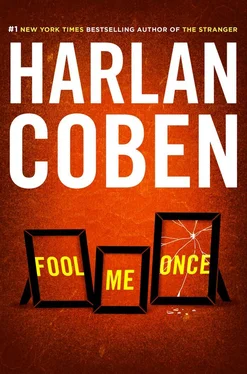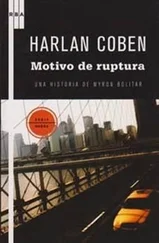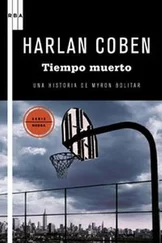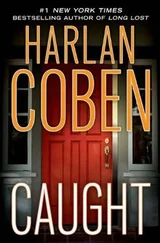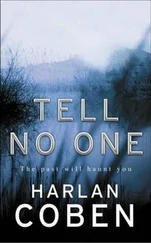Harlan Coben
Fool Me Once
For Charlotte:
Doesn’t matter how old you get, you’re still my little girl
They buried Joe three days after his murder.
Maya wore black, as befitted a grieving widow. The sun pounded down with an unflagging fury that reminded her of her months in the desert. The family pastor spouted the clichés, but Maya wasn’t listening. Her eyes drifted to the schoolyard across the street.
Yes, the cemetery overlooked an elementary school.
Maya had driven past here countless times, the graveyard on the left, the elementary school on her right, and yet the strangeness, if not obscenity, of the placement had never really registered with her before. Which came first, she wondered, the schoolyard or the cemetery? Who’d been the one to decide to build a school next to a cemetery — or vice versa? Did it even matter, this life-ending and life-beginning juxtaposition, or was it, in fact, somewhat poignant? Death is so close, always, a breath away, so perhaps it was wise to introduce children to that concept at an early age.
Maya filled her head with inanities like this as she watched Joe’s casket disappear into the earth. Distract yourself. That was the key. Get through it.
The black dress itched. Over the past decade, Maya had been to a hundred-plus funerals, but this was the first time she’d been obligated to wear black. She hated it.
To her right, Joe’s immediate family — his mother, Judith; his brother Neil; his sister, Caroline — wilted from the combination of high temperatures and deep sorrow. To her left, getting antsy and starting to use Maya’s arm as a rope swing, was her (and Joe’s) two-year-old daughter, Lily. The parenting cliché states that children do not come with instruction manuals. That never seemed more true than today. What, Maya had wondered, was the proper etiquette for a situation like this? Do you leave your two-year-old daughter at home — or do you take her to her father’s funeral? That was an issue that they didn’t cover on those know-it-all, one-size-fits-all mommy websites. In a fit of pity-anger, Maya had almost posted that question online: “Hi, Everyone! My husband was recently murdered. Should I bring my two-year-old daughter to the graveyard or leave her home? Oh, and clothing suggestions? Thanks!”
There were hundreds of people at the funeral, and in some dimly lit corner of her brain, she realized that this would have pleased Joe. Joe liked people. People liked Joe. But of course, popularity alone wouldn’t explain the crowd. Mourners had been drawn in by the horrible lure of being near the tragic: a young man gunned down in cold blood, the charming scion of the wealthy Burkett family — and the husband of a woman mired in an international scandal.
Lily wrapped both arms around her mother’s leg. Maya bent down and whispered, “Not much longer, sweetheart, okay?”
Lily nodded but held on even tighter.
Maya stood back at attention, smoothing the itchy black dress she’d borrowed from Eileen with both hands. Joe would not have wanted her in black. He’d always preferred her in the military formals she’d worn back in the days when she’d been Army Captain Maya Stern. When they’d first met at a Burkett family charity gala, Joe had walked straight up to her in his tails, given her the rakish smile (Maya hadn’t understood the term “rakish” until she saw that smile), and said, “Wow, I thought the turn-on was supposed to be men in uniform.”
It was a lame pickup line, just lame enough to make her laugh, which was all the opening a guy like Joe needed. Man, he was so damn handsome. The memory, even now, even standing in this stifling humidity with his dead body feet away, made her smile. A year later, Maya and Joe were married. Lily came not long after that. And now, as though someone had fast-forwarded a life-together tape, here she was, burying her husband and the father of her only child.
“All love stories,” Maya’s father had told her many years ago, “end in tragedy.”
Maya had shaken her head and said, “God, Dad, that’s grim.”
“Yes, but think about it: You either fall out of love, or, if you’re really one of the lucky ones, you live long enough to watch your soul mate die.”
Maya could still see her father sitting across from her at the kitchen table of yellowing Formica laminate in their Brooklyn town house. Dad wore his customary cardigan sweater (all professions, not just those in the military, wear uniforms of some kind or another), surrounded by the college essays he’d have to grade. He and Mom had died years ago, within months of each other, but in truth, it was still hard for Maya to know which category of tragedy their love story fell into.
As the pastor prattled on, Judith Burkett, Joe’s mother, took hold of Maya’s hand in the death grip of the grieving.
“This,” the old woman mumbled, “is even worse.”
Maya didn’t ask for clarification. She didn’t have to. This was the second time Judith Burkett had been forced to bury a child, two of her three sons now gone, one supposedly by tragic accident, one by murder. Maya glanced down at her own child, at the top of Lily’s head, and wondered how a mother could live with such pain.
As if she knew what Maya was thinking, the old woman whispered, “It’ll never be okay,” her simple words cutting through the air like a reaper’s scythe. “Never.”
“It’s my fault,” Maya said.
She hadn’t meant to say it. Judith looked up at her.
“I should have...”
“There was nothing you could have done,” Judith said. But there was still something off in the tone. Maya understood, because others were probably thinking the same thing. Maya Stern had saved so many in the past. Why couldn’t she have saved her own husband?
“Ashes to ashes...”
Wow, did the pastor really trot out that hackneyed chestnut or had Maya imagined it? She hadn’t been paying attention. She never did at funerals. She had been around death too many times not to understand the secret to getting through them: Go numb. Don’t focus on anything. Let all sounds and sights blur to the point of being unrecognizable.
Joe’s casket reached bottom with a thud that echoed too long in the still air. Judith swayed against Maya and let out a low groan. Maya maintained her military bearing — head high, spine straight, shoulders back. She recently had read one of those self-help articles people always emailed around about “power poses” and how they were supposed to improve performance. The military understood that tidbit of pop psychology way before its time. As a soldier, you don’t stand at attention because it looks nice. You stand at attention because, on some level, it either gives you strength or, just as important, makes you appear stronger to both your comrades and enemies.
For a moment, Maya flashed back to the park — the glint of metal, the sound of gunshots, Joe falling, Maya’s shirt covered in blood, stumbling through the dark, distant streetlights giving off hazy halos of illumination...
“Help... please... someone... my husband’s...”
She closed her eyes and pushed it away.
Hang on , she told herself now. Just get through it.
And she did.
Then there was the receiving line.
The only two places you stand on receiving lines are funerals and weddings. There was probably something poignant in that fact, but Maya couldn’t imagine what it could be.
She had no idea how many people walked past her, but it took hours. Mourners shuffled forward like a scene in some zombie movie where you slay one but more just keep coming at you.
Читать дальше
